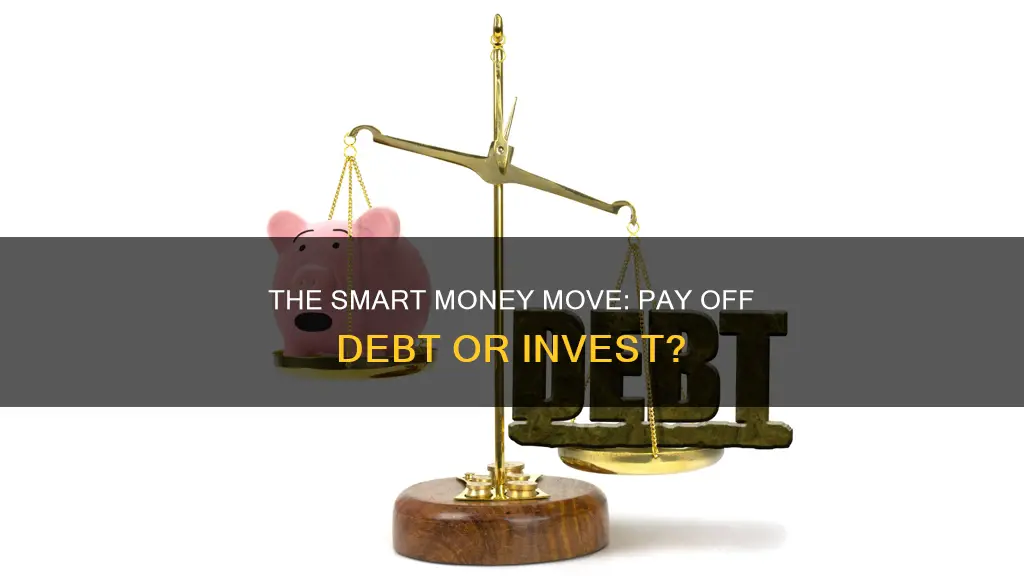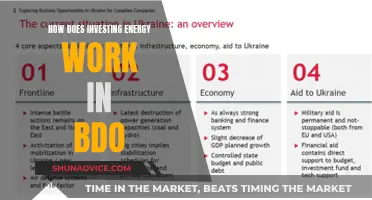
Whether to pay off a 0% APR credit card or invest depends on a number of factors. 0% APR credit cards can be a great way to consolidate existing credit card debt or make a large purchase, offering interest-free periods that typically range from six months to nearly two years. During this time, cardholders can make their own repayment plans and pay a minimum amount each month without accruing interest. However, it's important to note that the 0% APR period doesn't last forever and failing to make timely payments can result in late fees and the loss of the 0% offer. Additionally, some cards may charge a balance transfer fee, which is typically around 3% of the transferred balance.
On the other hand, investing involves putting money into financial schemes, stocks, or real estate with the expectation of earning a profit. Investing can be a great way to grow your wealth over time, but it also comes with risks. The value of investments can go down as well as up, and there is no guarantee of returns.
When deciding whether to pay off a 0% APR credit card or invest, it's important to consider factors such as the length of the introductory period, the potential returns on investments, and your financial goals and risk tolerance. If you have high-interest credit card debt, transferring it to a 0% APR card can be a good strategy to save on interest and pay off your debt faster. However, if you are confident that you can earn a higher return on your investments than the interest you would pay on the credit card, investing may be a better option. Ultimately, the decision depends on your individual circumstances and financial goals.
| Characteristics | Values |
|---|---|
| Pros | Save money on interest |
| Improve credit score | |
| Enjoy perks and rewards on spending | |
| Pay down debt faster | |
| Lower monthly payments | |
| Cons | Introductory APR period doesn't last forever |
| Late payments can foil your plans | |
| New credit cards can temporarily impact your credit score | |
| Balance transfer fees may apply | |
| Zero-interest offers can make you complacent |
What You'll Learn

Paying off debt can free up cash in the future
Another benefit of paying off debt is the feeling of financial freedom and the reduction of mental and emotional stress associated with monetary obligations and bills. Paying off debt early can also help you avoid potential risks and uncertainties. For instance, if you pay off a 0% interest loan early, you won't have to worry about deferred interest rates, which can be quite high and shocking.
Furthermore, paying off debt can grant you more flexibility in case of emergencies or unexpected expenses. If you have already paid off your loan, you won't need to take out a new personal loan, which may have a higher interest rate. By eliminating debts early, you can achieve greater financial freedom and ensure that other areas of your financial life, such as an emergency fund or potential investments, are not neglected.
In conclusion, paying off debt can provide both financial and psychological benefits. It can free up cash in the future by reducing monthly expenses, improving your credit score, and providing a sense of financial freedom and security. However, it's important to assess your financial situation and priorities before deciding whether to pay off debt early or invest elsewhere.
Retirement Investments: Living Off Profits
You may want to see also

Positively affect credit score and usage
Positively Affecting Your Credit Score and Usage
A 0% APR credit card can be a great tool to improve your credit score and usage. Here are some ways to do it:
- Understand the Terms: Before applying for a 0% APR card, make sure you understand the terms and conditions. The 0% rate usually applies for a promotional period, after which the regular APR will kick in. Know what the APR is for purchases, balance transfers, and cash advances, as they may differ.
- Make Timely Payments: Ensure you make at least the minimum monthly payments on time. Late or missed payments can result in penalties, higher interest rates, and a negative impact on your credit score. Set up automatic payments if needed.
- Keep Utilization Low: Aim to keep your credit utilization ratio below 30%. This is the amount of credit you're using compared to your total credit limit. A lower ratio demonstrates greater financial responsibility and can positively impact your score.
- Pay Off Balances Promptly: While 0% APR cards provide an interest-free period, don't wait until the end of this period to pay off your balances. The faster you pay off your debts, the better it looks on your credit report.
- Monitor Your Credit: Keep a close eye on your credit score and report. This will help you understand how your usage of the 0% APR card is impacting your credit. Services like NerdWallet can help you track your spending and provide recommendations.
- Be Selective: Only apply for 0% APR cards that you have a good chance of being approved for. Each application results in a hard inquiry on your credit report, which can cause a small temporary dip in your score. Space out your applications to give your score time to recover.
- Use It Responsibly: Ultimately, responsible usage is key to positively affecting your credit score and usage. This includes making timely payments, keeping your balances low, and only taking on debt that you can comfortably repay.
Young Investors: Where to Begin?
You may want to see also

The feeling of being debt-free
Being debt-free can bring a sense of financial freedom and positively impact your mental and emotional well-being. Here are some benefits of becoming debt-free:
Reduced Anxiety and Increased Financial Security
Enhanced Savings and Financial Flexibility
When you're debt-free, the money that would have gone towards debt payments can now be channelled into savings. This increased savings capacity enables you to plan for fun activities, such as travel or hobbies, without the burden of debt. Additionally, you gain the flexibility to choose how to allocate your money, whether it's investing in yourself, your business, or helping others.
Improved Credit Score and Financial Indicators
A debt-free lifestyle often leads to an improved credit score and other positive financial indicators, such as a lower debt-to-income ratio. This, in turn, can make you more attractive to lenders and landlords, potentially resulting in better mortgage rates and rental opportunities. A higher credit score can also eliminate the need to pay deposits on utilities and cell phones.
Career Path and Opportunity Exploration
Being debt-free can provide the financial cushion needed to explore different career paths or take advantage of new opportunities. It empowers you to make career decisions based on your passions and life goals rather than solely financial considerations. Additionally, the reduced financial burden can give you the flexibility to move or travel freely without the weight of debt holding you back.
A Sense of Accomplishment and Positive Feedback
Becoming debt-free is a significant accomplishment that can evoke a range of emotions, from disbelief to joy. Sharing your debt-free journey with others can inspire and provide support to those facing similar financial challenges. It can also lead to interesting conversations and a sense of community as people relate to your financial triumphs and struggles.
Jio: India's Digital Revolution
You may want to see also

The potential downsides of using this type of credit card
The potential downsides of using a 0% intro APR credit card are:
Late payments can foil your plans
Making a late payment on a 0% intro APR credit card can cause a forfeiture of the card’s introductory APR period. This is because late payments are usually a violation of the introductory offer terms. You may even end up paying a penalty APR that is higher than the card’s standard variable APR if you’re late or miss a payment.
New credit cards can temporarily impact your credit score
Applying for a new credit card results in a hard inquiry on your credit report that can ding your credit score. However, keep in mind that the impact is temporary and minor. Unless you need to keep your credit in tip-top shape because you’re applying for a loan soon, a slight decrease in your score is nothing to worry about.
Balance transfer fees can apply to transferred debt
If you plan to use a 0% intro APR credit card to consolidate high-interest debt, you’ll likely owe a balance transfer fee that typically falls between 3% and 5% of the amount you transfer. While paying this fee may be worth it for the interest savings, it’s important to understand that balance transfers are seldom free.
Intro APR periods don’t last forever
Zero-interest offers are for a limited time only — anywhere from 12 to 21 months, depending on the card. When the intro period ends, the remaining balance will begin racking up debt at your card’s regular variable rate. Remember that credit cards typically charge higher interest rates than other financial products, like personal loans and home equity loans.
Zero-interest offers can make you complacent
Carrying debt at a 0% APR can give you a false sense of security. Since you know interest isn’t accruing on your purchases or transferred debts, it’s easy to become complacent and pay less each month than you should. Credit cards with a 0% intro APR — especially those with rewards — can even entice you to spend more than you planned.
Retirement Savings: Why the Reluctance?
You may want to see also

How to choose the right 0% APR card
Choosing the right 0% APR card can be tricky, but there are some key considerations to keep in mind. Here are some tips to help you make an informed decision:
- Know your credit score: Before applying for a 0% APR card, check your credit score to see if you meet the requirements. The best cards typically require good to excellent credit.
- Determine the type of offer you need: Decide if you need a 0% APR for purchases, balance transfers, or both. Some cards offer different timelines for each.
- Consider the length of the offer: Look for a card with a 0% APR period that gives you enough time to pay off your debt. The longer the offer, the more time you'll have.
- Note any offer limitations: Read the fine print to understand the limitations and restrictions associated with the card. Some cards may revoke the 0% APR if you miss a payment.
- Understand the card's fees: Pay attention to annual fees, balance transfer fees, foreign transaction fees, and late fees. Choose a card with fees that you're comfortable with.
- Look for additional perks: Consider cards that offer rewards, exclusive memberships, retail discounts, credit monitoring, purchase protection, or statement credits.
- Compare different cards: Research and compare multiple 0% APR cards from different issuers to find the best fit for your needs.
Loan Payments: Financing or Investing?
You may want to see also
Frequently asked questions
A 0% APR credit card can help you save money on interest, lower your monthly payments, pay down debt faster, and improve your credit score.
The 0% APR offer is only valid for a limited time, and if you don't pay off your balance before the promotional period ends, you'll be charged a high interest rate on the remaining amount. Additionally, you might have to pay a balance transfer fee, and late or missed payments can result in the cancellation of the 0% APR deal and hurt your credit score.
Carrying a balance on a 0% APR credit card can be beneficial if you're transferring a balance from a high-interest card, need to make a large purchase that you can't pay off right away, or want to take advantage of other balance transfer card incentives.
You must make at least the minimum payments on time, some intro APR offers only apply to purchases or balance transfers but not both, you might lose your grace period, and carrying a balance can negatively impact your credit score by increasing your credit utilization ratio.
If you have a larger balance than you can handle at the end of the 0% intro APR period, try to pay off as much as possible before the regular APR kicks in. You could also consider transferring your balance to another 0% intro APR card, but be cautious as this could lead to a cycle of debt if not managed properly.







